- Home
- David Gemmell
Ghost King Page 4
Ghost King Read online
Page 4
Gwalchmai swore. “You think they guessed who we were?” he asked.
“Perhaps,” replied Victorinus, “but it is more likely to have been the normal British penchant for tribal disharmony. Come, we had better be on our way.”
“How far is it to the Wall of Hadrian?”
“Too far—unless the gods smile.”
Cael chuckled at his brother’s discomfort as they walked across the cobbled courtyard to the carles’ quarters. “You should not have mentioned the sword,” said the taller man.
“Go ahead, enjoy yourself, Cael. But I know what I saw. When he threw that blade out over the ice, a hand came up out of the water and drew it down.”
“Yes, Brother. Was it a man’s hand?”
“Your mockery does not upset me. Two other men saw the hand even if you did not.”
“I was too busy putting the finishing blow to the Roman’s neck,” Cael snapped.
“A blow, I notice, that came from behind. Even without his sword, you did not have the courage to cut him from the front.”
“You speak of courage?” Cael sneered, pausing before the oak doors of the carles’ quarters. “Where were you? You did not land a blow.”
“I considered eighteen to one good enough odds even for you, Cael.”
“You miserable sheep! Bleat all you want. I did not hear your voice raised in argument when Father’s plan was made known.”
“The deed was ignobly done. There is no credit in such a murder. And by all the gods beyond, he died well. Even you must admit that.”
“He had a choice, then, you think? Even a cornered rat will fight for its life.”
Cael finished the conversation by turning away from his brother and pushing ahead into the dimly lit quarters, seeking Alantric. Moret turned back across the courtyard and returned to his apartments, where his young wife, Alhyffa, waited. She was dark-haired and sloe-eyed, and Moret’s passion for her grew daily. He had not wanted to wed the Saxon girl and had argued long into the night with his father. But in the end, as he had known he would, he had given in and the betrothal had been secretly agreed to. He had traveled by ship to meet his bride, all the way around the coast to the lands they were now calling the South Saxon.
Her father had met him in an inlet near Anderida forest, and he had been taken to the long hall to see his bride. His heart had been heavy until the moment she had entered the hall … then it had all but stopped. How could a barbarous animal like Hengist produce such offspring? As she approached, he bowed low, breaking all precedent. If she was surprised, she did not show it. He stopped her as she was about to kneel.
“You will never need to kneel before me,” he whispered.
And he had been true to his word, a fact that had surprised Alhyffa, especially after her father’s disparaging comments concerning the treacherous family.
“Have no fear,” he had told her. “Within a few seasons I shall be at Deicester Keep with an army, and then we’ll find a good husband for you.”
Yet now Alhyffa was not sure that she wanted her father riding north to take her back. Her husband was not a powerful man or a weak one, but he was gentle and loving and aroused in her a feeling not unlike love. As he entered the room, she watched his expression move from his perennial look of sadness to an almost juvenile joy. He swept her into his arms and swung her high into the air.
She draped her arms over his broad shoulders and kissed him lightly.
“I have missed you,” he said.
“You liar! You have not been gone an hour.”
“It’s true; I swear it.”
“How went it with your father?”
He shrugged and released her, his face once more sad and wistful. “I have no use for his lust for power. And my brother is as bad—if not worse. You know, Aurelius Maximus was not a bad High King.”
“My father spoke of him always with respect.”
“And yet your father connived in his murder.”
She pulled him to the window bench and sat beside him in the sunshine. “The High King would have connived in the murder of Hengist, yet I do not doubt that he also respected my father. There has never been a king with clean hands, Moret. You are altogether too sensitive.” He grinned and looked so terribly young that she took his face in her hands and kissed his fair cheeks, running her fingers through his long blond hair. “You have given me happiness. I pray to Odin that you receive a proper reward for it.”
“You are reward enough for any man.”
“You say that now, young prince, but what when my beauty fades?”
“Ask me that in twenty years. Or thirty. Or forty. Or a hundred!”
Her face became serious. “Do not wish for the passing of time, Moret, my love. Who knows what the future holds for any of us?”
“Whisht! Do not look sad. The future is all gold, I promise you.”
Alhyffa pulled his head into her breast and stroked his hair while her sky-blue eyes stared out toward the south. She saw three horsemen riding, and each was holding aloft a severed head. They came closer—riding across the sky toward the window where she sat—and the sky darkened, lightning flashing behind them. She could not see their faces, nor would she look at the heads they carried; she closed her mind’s eye against them and heard the bitter laughter as they rode on: Odin’s messengers, the Stormcrows, taunting her with premonitions of disaster.
She had never loved her father and thus had never cared about his victories or setbacks. But now she was torn. Moret’s family was linked with Hengist, and therefore she should wish him success. Yet once successful, her father would turn on Eldared and destroy him and all his get. Eldared with all his cunning could not fail to see this; therefore, he must be planning the same tactic. And then what would be the future for Hengist’s daughter?
“Do not think of tomorrow, Moret. Enjoy the now, for it is all any of us ever have.”
4
THURO AWOKE IN a narrow room with log walls and a single window looking out over the mountains. The room was ice-cold, and the young prince burrowed under the blankets, hugging them to his sleep-warm body. He could not remember coming to bed, only the seemingly endless journey to Culain’s log cabin nestling in a wood of pine. At one point Thuro’s legs had given way beneath him, and Culain had lifted him effortlessly and carried him like a babe across his chest. Thuro remembered being dumped in a wide leather chair as the warrior tindered a fire in the stone hearth, and he could recall staring into the growing flames. But somewhere about that time he must have passed out.
He looked out across the room and saw his clothes laid on a narrow chair. Glancing below the covers, he saw that he was naked. He hoped fervently that Laitha had not been present when he had been undressed.
The door opened, and Culain entered. His long dark hair was tied at the nape of his neck, and he was wearing a high-necked shirt of thick wool and dark leather leggings over mountain boots of cured sheepskin.
“Time to be up, Prince! And doing!”
He walked to the bed and dragged back the covers. “Dress yourself and join me in the other room.”
“Good morning to you,” Thuro told his departing back, but Culain did not respond. The prince climbed from the bed and into his green woolen leggings and shirt of cream-colored wool edged with braid. Then he pulled on his boots and returned to sit on the bed. The events of the previous day washed over him like icy water. His father was dead, and his own life was in peril. He was hundreds of miles from friends and home, at the mercy of a grim-faced stranger he did not know. “I could do with your help now, Maedhlyn,” he whispered.
Taking a deep breath and offering a prayer to the Earth Goddess, he joined Culain in the main room. The warrior was stacking logs in the hearth when he entered and did not look up.
“Outside you will find an ax and a hatchet. Chop twenty logs no bigger than you see here. Do it now, boy.”
“Why should I chop logs for you?” asked Thuro, disliking the man’s tone.
“Becau
se you slept in my bed, and I don’t doubt you’ll want to eat my food. Or is payment above you, Prince?”
“I will chop your logs, and then I will leave you,” Thuro said. “I like nothing about your manners.”
Culain laughed. “You are welcome to leave, but I will be interested to know in which snowdrift you are planning to die. You are weaker than any boy I have ever known. I doubt you have the strength to walk down the mountain, and you certainly do not have the wit to know which direction to take.”
“Why should my fate concern you?”
“I’ll answer that question when I’m ready,” Culain said, rising to his feet and moving to tower over the youngster. Thuro stood his ground and answered the firm gaze with uplifted chin, giving not an inch.
Culain smiled. “Well, boy, you may have no strength in your arms, but your spirit is not lacking, thank the Source. Now, chop the logs and we’ll discuss your departure over breakfast.”
Thuro felt he had won a small victory, but he was not sure what the prize might be or whether the win was worth a lick of salt. He left the cabin and located the wood store some eighty feet away, near a stand of trees.
He found the ax embedded in a log and wrestled it clear. Then he lifted the log to stand on a thick ring of pine and hefted the ax over his head. His first swing saw the ax head miss the log, burying itself in the snow-covered ground. He wrenched it clear, steadied his feet, and tried once more. This time the head glanced from the log, tearing the ax from Thuro’s slender fingers; he retrieved it. On the third swing the ax hit into the log, stopping half way through and trapping the head. After several minutes he worked it loose; then he stood and thought about the action necessary to complete the task. He planted his feet wider apart, with his right leg slightly ahead, swung the ax—and split the log. He continued work for some time, until his breathing became ragged and his face was white with exhaustion. He counted the logs. Eleven … and Culain had asked for twenty! More slowly now he continued the chore. His hands hurt, and he put down the ax to check the skin; four large blisters decorated his palm. He glanced toward the cabin, but there was no sign of Culain. Once more he counted the logs: eighteen. He took the ax in his injured hand and set to work until twenty had been split, leaving forty solid chunks.
Returning to the cabin, he found Culain sitting in the wide leather chair, his feet raised on a small table. The warrior looked up as he entered.
“I thought you’d fallen asleep out there, Prince.”
“I did not fall asleep, and I dislike the tone in your voice when you use my title—you make it sound like a dog’s name. My name is Thuro; if you are uncomfortable around royalty, you may use that.”
“May I indeed. What a singular honor! Where is the wood?”
“It is all chopped.”
“But it needs to be in here to be of any use, boy.”
Swallowing his anger, Thuro returned to the wood store and hefted three chunks, which he carried with ease back to the cabin, up the three steps, and into the hearth. He repeated this maneuver eight times before his arms burned like fire and his feet dragged in the snow. Culain merely sat, offering no assistance. Twice more Thuro stumbled back bearing wood, then he staggered and fell to the cabin floor. Culain leaned from his chair and tapped the boy on the back.
“Seven more chunks, I think, young Thuro.”
The prince rolled to his knees, anger giving him strength as he staggered out into the snow and this time hefted four pieces, which he carried slowly back. His right hand was hot and sticky, and as he dumped the wood in the hearth, he noticed that blood was leaking from the torn blisters. He returned to the wood store and with a supreme effort carried the last of the chunks back to the cabin.
“Never leave an ax naked to the air,” said Culain. “Always embed it in wood; it protects the edge.”
Thuro nodded but lacked the strength for a retort. Once more in the open, he took the ax and plunged the head into a log.
“Anything else?” he called. “Or is it part of the game that I return first?”
“Come and eat,” Culain called.
The two broke fast with cold meat and cheese, and Thuro wolfed his small portion swiftly. This was followed by a dark ale so bitter that the prince choked. Culain said nothing, but Thuro finished the foul brew to preempt any sneer.
“How do you feel?” Culain asked.
“I am fine.”
“Would you like me to tend to your hand?”
Thuro was about to refuse when he saw that that was what the other man expected. He recalled the advice of Ptolemy, as reported by Plutarch: “As long as you react, your enemy holds your destiny in the palm of his hand. When you force him to react, you hold his neck in yours.” Thuro smiled. “That would be kind.”
Culain’s eyebrows rose. “Hold out your hand.” Thuro did so, and the warrior tipped salt from the shaker directly onto the wound. It stung like needles of fire. “That should suffice,” said Culain. “Now I would like you to do me a service.”
“I owe you nothing. I have paid for my breakfast.”
“Indeed you have, but I would like you to carry a message to Laitha. I don’t suppose you would want to leave without wishing her good-bye.”
“Very well. Where is she?”
“She and I built a cabin higher in the peaks. She likes the solitude. Go to her and tell her I would appreciate her company this evening.”
“Is that all?”
“Yes.”
“Then I shall bid you farewell, Culain lach Feragh—whatever that title may mean—and thank you for your awesome hospitality.”
“I think you should delay your departure—at least until you know where to find Laitha.”
“Then be so kind as to tell me.”
Culain gave him simple directions, and Thuro left without another word. The morning was bright and chilly without a trace of breeze, and he wandered through the bleak winter landscape for over an hour before coming to the path Culain had indicated, which was marked by a fallen tree. He turned to the right and continued the climb, stopping often to rest. It was almost dusk when the exhausted prince came to Laitha’s small cabin. She helped him inside, and he sat slumped before a log fire for several minutes, gathering his breath.
“I thought I would die out there,” he said at last.
She sat beside him. “Climb out of those wet clothes and get warm.”
“It is not fitting,” he replied, hoping she would offer an argument. She did not.
“I’ll fetch you something to eat. Some bread and cheese, perhaps.”
“That would be wonderful. I haven’t been this hungry since … I can’t remember.”
“It’s a long haul to my home. Why did you come?” She offered him some dark bread and a round of white cheese.
“Culain asked me to give you a message. He said he wanted your company this evening.”
“How strange.”
“The man is strange and quite the most discourteous individual I have ever met.”
“Well, I think it best you gather your strength and feed a little warmth into your body before we head back.”
“I shall not be going back. I have said my farewells,” Thuro told her.
“You must go back. It is the only way off the mountain, and it will be well after dark before we reach his cabin. You”ll have to spend at least one more night there.”
“Can I not stay here? With you?”
“As you said, Prince Thuro, that would not be fitting.”
“He knew that,” said Thuro. “He knew I would be trapped here. What evil game is he playing?”
“I think you presume too much,” she snapped. “You are speaking of a friend of mine—the greatest friend anyone could ever have. Perhaps Culain does not like spoiled young princelings. But he saved your life, as he saved mine ten years ago—at no small risk to himself. Did he ask you for payment for that, Thuro?”
Instinctively he reached out and touched her hand. She withdrew it as if stung. “
I am sorry,” he said. “I did not mean to offend you. North of the wall, you are now the only friend I have. But even you said it was strange that he asked me to come here. Why was that?”
“It does not matter. We should be going.”
“But it does matter, Laitha. Let me hazard a guess. You were surprised because you were going to him anyway. Is that not true?”
“Perhaps. Or perhaps he forgot.”
“He does not strike me as a forgetful man. He knew I would be forced back to his cabin.”
“Ask him when you see him,” she countered, donning a heavy sheepskin jerkin and opening the door of the cabin. Outside, a heavy snowfall was in progress and the wind was picking up alarmingly. With a curse Thuro had last heard from a soldier, she slammed the door. “We cannot leave now,” she said. “You’ll have to stay the night.” Thuro’s mood brightened considerably.
Just then the door opened, and Culain stepped inside, pausing to brush a dusting of snow from his shoulders.
“Not a good night for traveling, Prince,” he said. “Still, one or two chores in the morning and you’ll soon pay for your keep.”
Victorinus and Gwalchmai had been riding for four days, and for the last two they had been without food. The Roman was concerned more about the state of their supplies than about the possibility of capture, for the horses needed grain, and without horses they had no chance of leaving the land of the Brigantes.
“What I would not give for a good bow,” said Gwalchmai as they spotted several deer on the flanks of a low hill.
Victorinus did not respond. He was tired, and the growth of beard on his square chin made him irritable. He was a man who liked to be clean, and the smell of his own stale sweat also galled him as he scratched at his face, cursing the lack of a razor.
“You are beginning to look human,” said Gwalchmai. “Another few months and I’ll braid the beard for you; then you can walk in respectable company.”
Victorinus grinned, and some of his ill humor evaporated. “We have no coin left, Gwal, but somehow we must find food for the horses.”
“I suggest we aim for the high ground,” said Gwalchmai, “and try to spot a village or settlement. We can trade some of Caradoc’s gear; his sword should fetch a good price.” Victorinus nodded, but he did not like the idea. The saddest fact about the British tribes was that they were incapable of mixing together without bloodshed. The thought of Gwalchmai riding into any Brigante or Trinovante settlement filled him with apprehension.

 Bloodstone
Bloodstone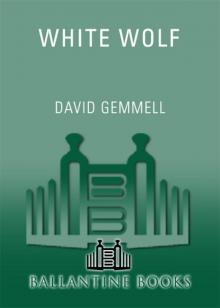 White Wolf
White Wolf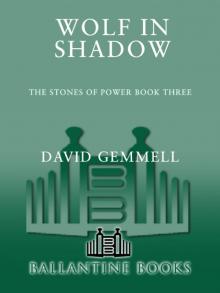 Wolf in Shadow
Wolf in Shadow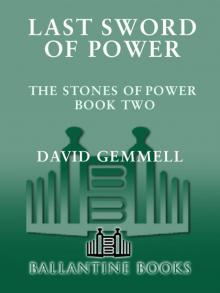 Last Sword of Power
Last Sword of Power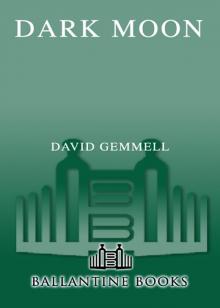 Dark Moon
Dark Moon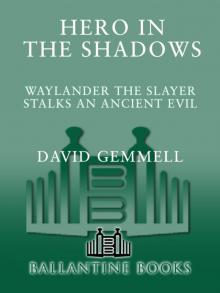 Hero in the Shadows
Hero in the Shadows Gemmell, David - Drenai 09 - Hero In The Shadows
Gemmell, David - Drenai 09 - Hero In The Shadows Waylander
Waylander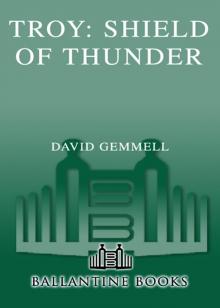 Shield of Thunder
Shield of Thunder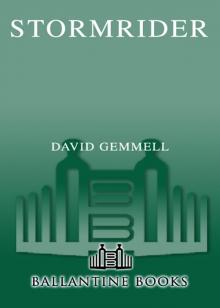 Stormrider Stormrider
Stormrider Stormrider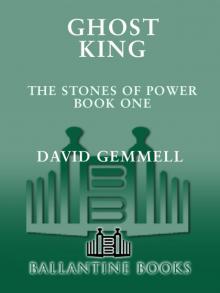 Ghost King
Ghost King Legend
Legend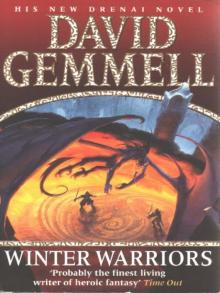 Winter Warriors
Winter Warriors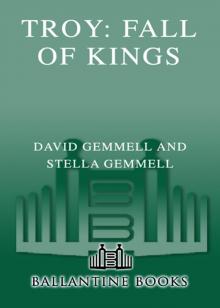 Fall of Kings
Fall of Kings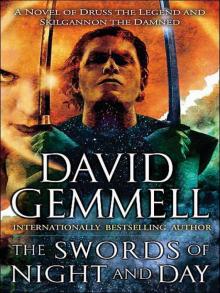 The Swords of Night and Day
The Swords of Night and Day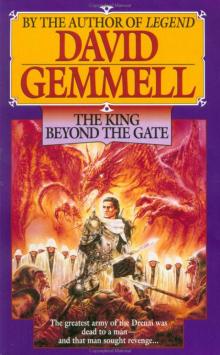 The King Beyond the Gate
The King Beyond the Gate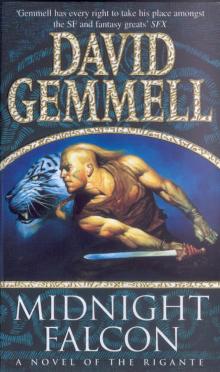 Midnight Falcon
Midnight Falcon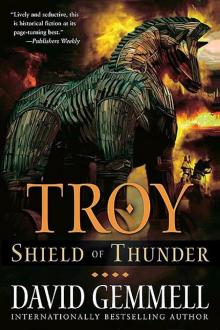 02 - Shield of Thunder
02 - Shield of Thunder In the Realm of the Wolf
In the Realm of the Wolf Ravenheart
Ravenheart The First Chronicles of Druss the Legend
The First Chronicles of Druss the Legend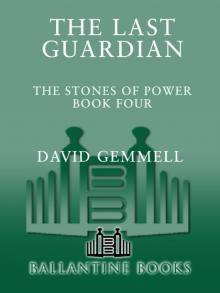 Last Guardian
Last Guardian Stormrider
Stormrider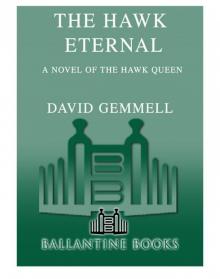 The Hawk Eternal
The Hawk Eternal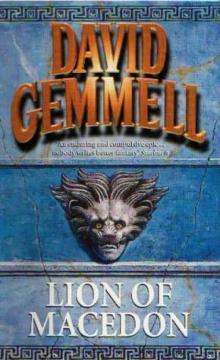 Lion of Macedon
Lion of Macedon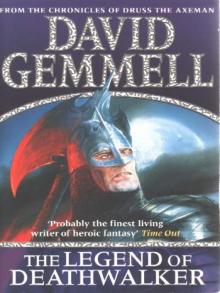 The Legend of Deathwalker
The Legend of Deathwalker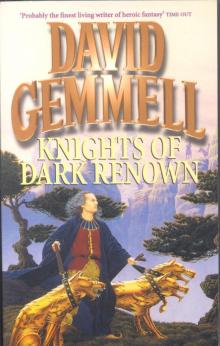 Knights of Dark Renown
Knights of Dark Renown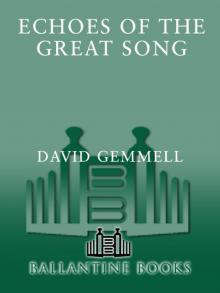 Echoes of the Great Song
Echoes of the Great Song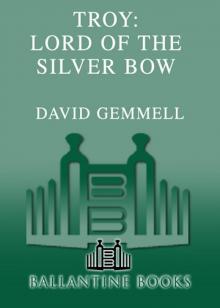 Lord of the Silver Bow
Lord of the Silver Bow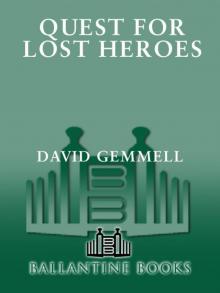 Quest for Lost Heroes
Quest for Lost Heroes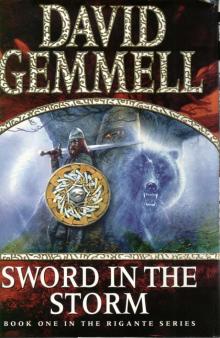 Sword in the Storm
Sword in the Storm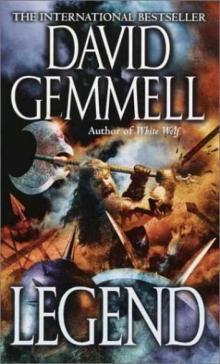 Drenai Saga 01 - Legend
Drenai Saga 01 - Legend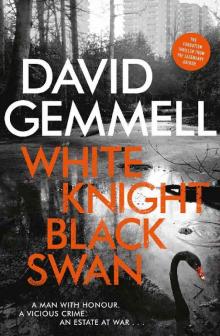 White Knight/Black Swan
White Knight/Black Swan![[Troy 02] - Shield of Thunder Read online](http://i1.bookreadfree.com/i/03/19/troy_02_-_shield_of_thunder_preview.jpg) [Troy 02] - Shield of Thunder
[Troy 02] - Shield of Thunder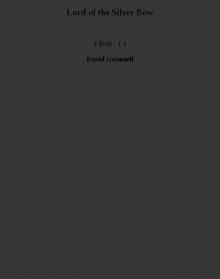 Lord of the Silver Bow t-1
Lord of the Silver Bow t-1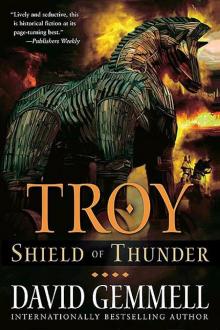 Shield of Thunder t-2
Shield of Thunder t-2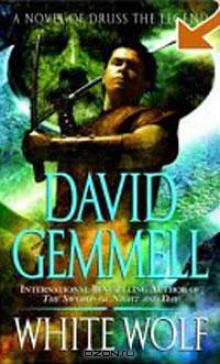 White Wolf: A Novel of Druss the Legend dt-10
White Wolf: A Novel of Druss the Legend dt-10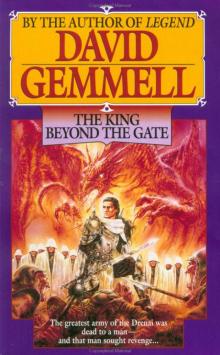 Drenai Saga 02 - The King Beyond the Gate
Drenai Saga 02 - The King Beyond the Gate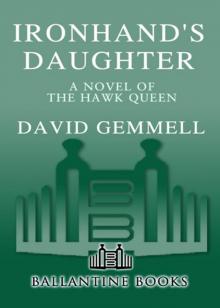 Ironhand's Daughter
Ironhand's Daughter Gemmell, David - Drenai 06 - The First Chronicles of Druss the Legend
Gemmell, David - Drenai 06 - The First Chronicles of Druss the Legend The Last Guardian
The Last Guardian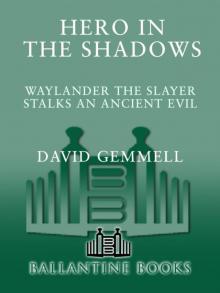 Hero in the Shadows: A Waylander the Slayer Novel
Hero in the Shadows: A Waylander the Slayer Novel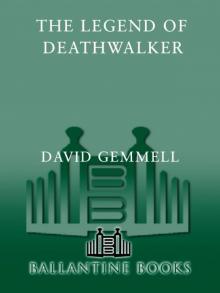 The Legend of the Deathwalker
The Legend of the Deathwalker